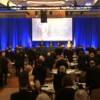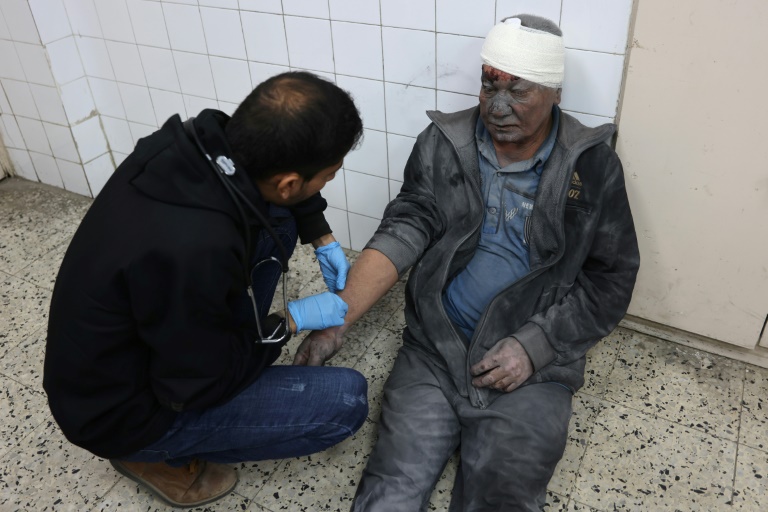‘Which parts of the world do we stop covering?’ Former leaders alarmed by USCCB layoffs ask

Top Stories Tamfitronics
(RNS) — In the wake of major layoffs in one department of the U.S. Catholic Bishops’ Conference, concerns are being raised about whether the department, which works on aid and justice initiatives domestically and internationally, has the capacity to continue its work.
The layoffs and restructuring, announced internally on June 24, to the USCCB’s Department of Justice, Peace & Human Development, renamed the Secretariat of Justice and Peace as part of the restructuring, included the elimination of seven staff positions of 23 by the conference’s own count in a memo to bishops on June 28. A spokesperson for the USCCB did not respond to Religion News Service questions about additional positions eliminated through retirements or resignations, as some have argued this is an undercount.
Bishops who previously chaired the conference’s committee on international justice and peace are raising the alarm on how cuts may limit the work of the department, especially with its global partners.
San Jose, California, Bishop Oscar Cantú, who served as chair for the committee on international justice and peace from 2014 to 2017, expressed concern in an email to RNS about the staff positions that were cut.
“I believe it would be quite difficult for two persons to do the work of that office,” Cantú wrote, noting the office had previously had four experts, with each covering either the Middle East, Africa, Latin America or Asia, as well as an administrative assistant.
The bishop said the cuts presented a difficult question: “Which parts of the world do we stop covering?”
Gerard Powers, who previously served as the director of the office of international justice and peace, underscored in an email to RNS that the most recent cuts are part of a significant change over the last two decades. “In 2004, my last year as director of the Office of International Justice and Peace, the office had 8.5 staff; today it has 2,” Powers wrote.
“Whatever the reason for the cuts, the bishops have much less capacity to be in solidarity with a Church that is in the forefront of work for justice and peace from Congo and Colombia to Ukraine and the Holy Land,” Powers wrote. Conference leadership cited finances for the decision, but several former leaders have questioned that financial rationale.
Because of that reduced capacity, Powers, who now serves as the coordinator of the Catholic Peacebuilding Network and as the director of Catholic peacebuilding studies at the University of Notre Dame, wrote, “The wider Catholic community in the United States must find new ways to continue to respond to the world’s most pressing needs, as it has done so effectively for so long.”
“The Office of International Justice and Peace has been a critical part of the Catholic Peacebuilding Network (CPN) since its founding in 2004, and we hope and expect that will continue,” Powers wrote.
Retired Des Moines, Iowa, Bishop Richard Pates, who chaired the international justice and peace committee immediately before Cantú, beginning in 2011, told RNS that the office’s shrinking is a “drastic change from what the priorities had been in the past,” impacting the office’s ability to form relationships and respond to crises.
“The budget of an organization reflects its priorities,” said Pates, who served on the international justice and peace committee for a total of nine years in addition to several other committee assignments.
Pates said the revised budget seems to represent “somewhat of a withdrawal” from Pope Francis’ leadership and commitment “to relationships and ministry dedicated to justice and peace and being truly a missionary church,” emphasizing that Francis had encouraged the church to move toward “dialogue” and being “less self-referential” shortly before his election as pope.
Bishop Richard E. Pates greets a group of nuns after celebrating Mass at the Church of the Holy Sepulchre on the first afternoon of the visit. Photo by Jen Hardy/ Catholic Relief Services
The bishop also criticized the decision-making process that led to the layoffs. “The path that was chosen did not provide for transparency — nor was it an exercise in the spirit of synodality — in order to arrive at consensus that included the process of respectful listening to all conference members,” he said.
These are conversations, said Pates, that could have occurred at the bishop’s conference meetings earlier in June, just two weeks before the layoffs and restructuring.
“Since the USCCB was in general session in Louisville, there would have been ample time to review necessary budget modifications and to present alternative options for discussion to retain a balanced budget,” said Pates.
At the meetings, the future of the Catholic Campaign for Human Development, another initiative that had been housed in the same department as the office of international justice and peace, was discussed in executive session, which is closed to the public.
Several bishops have expressed shock at the news of the layoffs in both the Catholic Campaign for Human Development and the rest of the department given that CCHD had received strong support at the meetings.
“From personal experience and on the basis of conversations with brother bishops, it is important that full dialogue be conducted in the broad scope of budgeting considerations in a spirit of transparency, synodality, and the mission ‘ad omnes,’” said Pates.
In an unusually pointed, public criticism of conference leadership, Santa Fe, New Mexico, Archbishop John Wester published an opinion article in the Jesuit magazine America, writing, “Unfortunately, with all due respect to the leadership, I believe the U.S.C.C.B. is quietly taking extraordinary actions that curtail our sacred social mission,” the archbishop wrote, citing Luke 4 and Matthew 25.
Wester has taken a prominent role advocating for nuclear disarmament given that his archdiocese houses the biggest U.S. stockpile of nuclear weapons and two of the three U.S. nuclear weapons research facilities, as well as forcefully advocating for peace priorities in the federal budget and in the ongoing Israel-Hamas war in Gaza.
FILE – Archbishop John C. Wester, head of the Archdiocese of Santa Fe, N.M., talks to reporters on Nov. 29, 2018, in Santa Fe.
“After the bishops’ strong support of our social mission two weeks prior, how did this happen?” Wester asked. “After my 26 years as a bishop, I am appalled that the U.S.C.C.B. would undermine a vital function without a process involving consultation and transparency,” he wrote.
In the opinion piece, Wester clarified that he was writing “not to attack anyone, but to assure Catholics that many, many bishops are advocating for robust justice and peace work within the conference.”
Pates expressed hope that the issue would be addressed at the bishops’ conference meetings in November.
“My experience at the conference is that the annual budget requires the approval of all of the bishops in session, so I would expect that, as we talk about budgetary concerns, hopefully this might be addressed,” Pates said.
Discover more from Tamfis Nigeria Lmited
Subscribe to get the latest posts sent to your email.



 Hot Deals
Hot Deals Shopfinish
Shopfinish Shop
Shop Appliances
Appliances Babies & Kids
Babies & Kids Best Selling
Best Selling Books
Books Consumer Electronics
Consumer Electronics Furniture
Furniture Home & Kitchen
Home & Kitchen Jewelry
Jewelry Luxury & Beauty
Luxury & Beauty Shoes
Shoes Training & Certifications
Training & Certifications Wears & Clothings
Wears & Clothings



















